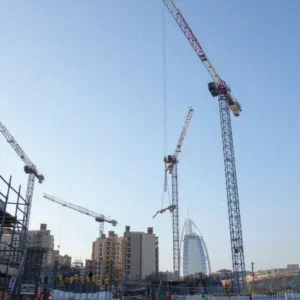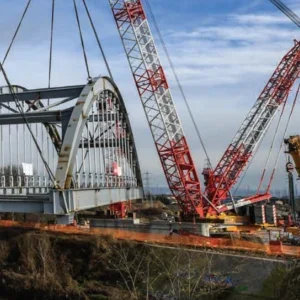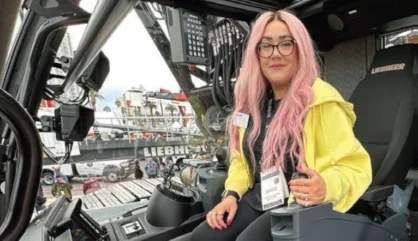
The 8th March is International Woman’s Day. The day is designed to honour the achievements of women across all aspects of life – social, economic, cultural, and political – while also advocating for gender equality.
To celebrate the occasion, and to help raise awareness of the benefits of greater gender balance in the lifting arena, we invited a selection of high-profile women working in the UK lifting industry to share their thoughts on the subject.
Over the next few pages Andrea Lowrie and her sister Hayley Sutch from John Sutch Cranes, the CPA’s Katie Kelleher, Gill Riley from GGR, Sarah Spivey from Modulift, and Leanne Whitehurst-Maiden, national digitalisation manager at Rope and Sling Specialists (RSS) share insights about the realities of being a woman in lifting and offer some wise words of advice…
ANDREA LOWRIE, HR DIRECTOR, AND HAYLEY SUTCH, DIRECTOR, JOHN SUTCH CRANES
With three decades of experience in the crane industry, Hayley Sutch has worked through all areas of the business, including purchase ledger, credit control, health and safety, and the hire desk. Her understanding of the industry and her extensive handson experience have been pivotal to the growth and success of John Sutch Cranes.
Hayley oversees the day-today running of the business and is responsible for key decisionmaking processes. Her leadership ensures the smooth operation of the company, maintaining high standards of service and safety.
Andrea Lowrie joined John Sutch Cranes in 1993, bringing her extensive experience and dedication to the Administration Department. As the HR Director, Andrea has been a vital part of the team for over three decades.
Andrea is responsible for processing weekly and monthly payroll, enrolling employees in the pension scheme, and managing holiday bookings. Her role is crucial in ensuring smooth HR operations and maintaining employee satisfaction.
Can you tell us who you are, a bit about the history of your crane hire company, and how you got involved in the lifting business?
John Sutch Cranes is a family-run business with a strong reputation for reliability, expertise, and safety in crane hire. Established by our dad, John Sutch, the company has grown to become one of the leading names in the UK’s crane and lifting industry.
We provide cutting-edge work for construction, infrastructure, and specialist lifting projects. As directors, we have been immersed in the business from an early age, gaining hands-on experience in various aspects of operations, from logistics to client management.
We both have separate roles in the business, Andrea more the people and HR aspects; Hayley more operational. But you could find us both in the yard with dad or in the back office with mum.
What inspired you to join and take leadership roles in the company?
Growing up around the business, we saw first-hand the impact of quality service, strong leadership, and innovation in crane hire.
Our dad’s passion for the industry inspired us to get involved, and as we gained experience, we became determined to drive the company forward while maintaining its core values. We wanted to bring fresh perspectives, embrace modernisation, and ensure that John Sutch Cranes remains an industry leader. Dad is in his 70s now and still has the energy he had 30 years ago but we are now taking more of a hands-on role in the business, supported by other key leaders. We are a family business at heart and maintain those family values.
What’s a typical day like for you in the business?
No two days are the same! One day might involve site visits and overseeing operations, while another could be dedicated to strategic planning, customer relations, or team development.
We spend a lot of time ensuring that projects run smoothly, liaising with clients, and making key business decisions to enhance efficiency, safety, and service quality. Managing a crane hire business is dynamic and fastpaced, requiring a balance of hands-on involvement and longterm planning. While we were in the cabin of the crane years ago, we’re not there now! Lifting is just one part of the business.
The construction and lifting industries are traditionally male-dominated. Have you faced any particular challenges as women in this field?
There have been challenges, particularly in the early years, as the industry has historically been male-dominated. At times, we’ve had to work harder to prove our expertise and leadership. However, we’ve also found that leading with confidence, knowledge, and professionalism has earned us respect across the industry.
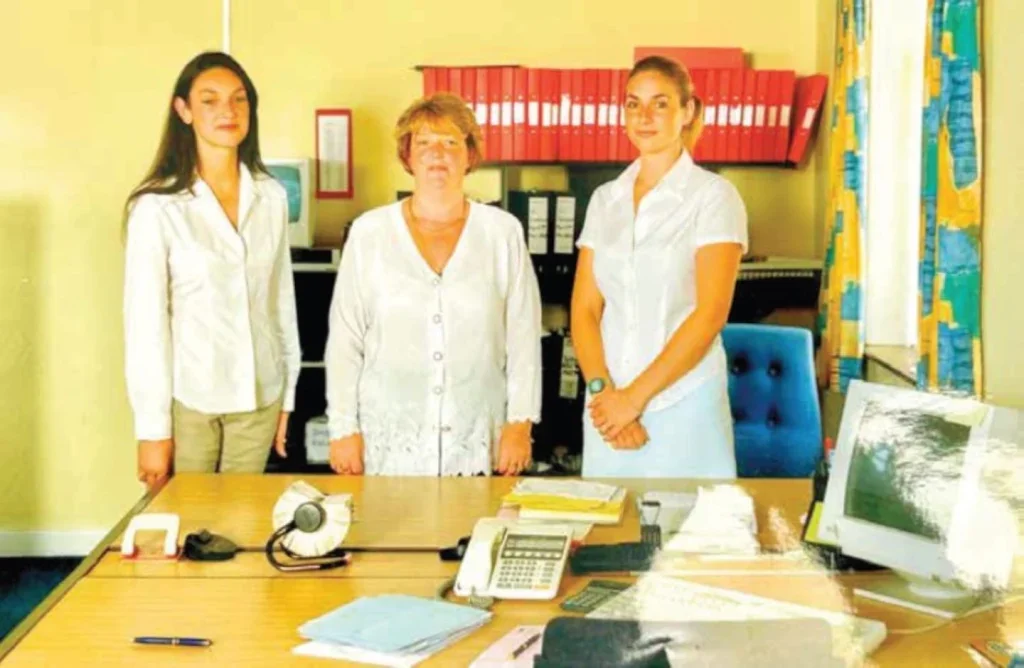
Nowadays you see more women in construction. We’ve been involved from the very start – even before ‘women in construction’ was a thing; we were doing our bit. And it wasn’t just us, it was mum too and the other female family members who work in the business.
Do you think attitudes towards women in construction and lifting have changed over the years?
Yes, there has been a noticeable shift. More companies are embracing diversity and recognising the value that women bring to the industry. There’s still progress to be made, but we’ve seen increasing numbers of women in leadership, engineering, and operational roles, which is a positive step forward.
What do you think needs to happen to encourage more women to join the industry?
Education and awareness are key. There needs to be more visibility of female role models in construction and lifting, along with targeted outreach in schools and colleges to highlight the career opportunities available. Companies also need to ensure that their workplaces are inclusive and supportive, offering training, mentorship, and career progression opportunities for women. Provision for women out on site is also important. Running water, female toilets that are locked and kept clean – things like that are essential.
What are the benefits having more women in a workforce can bring?
A diverse workforce brings different perspectives, problemsolving approaches, and leadership styles. Women can contribute fresh ideas, strong communication skills, and attention to detail, all of which are critical in crane operations.
A balanced workforce also promotes a more inclusive, forward-thinking industry.
In the crane industry things can get heated and years ago approaches to solving issues could be a bit ‘bull in a china shop’; but now it’s different and I think the influence of women on site and in business has promoted a shift to calmer behaviour.

Are there any particular areas you see as being most accessible for women to work in? And are there certain areas you think need more women in them?
Women are already excelling in areas such as project management, engineering, health and safety, and logistics. However, we’d love to see more women in hands-on operational roles, including crane operation and site management.
But you can’t just jump into the biggest crane out there. You have to earn your stripes like anyone else and at John Sutch Cranes we wouldn’t have it any other way. While we want women in the roles, we know it’s about being the best person for the job.
There’s areas in our business that offer fantastic career opportunities, and increasing female representation would help break down outdated stereotypes.
Have you noticed an increase in women working in crane operation and lifting?
Yes, though the numbers are still relatively small, we are seeing more women pursuing careers in crane operation, engineering, and site management. The growing focus on diversity in the industry is encouraging, but there’s still room for improvement.
How does John Sutch Cranes support diversity and inclusion in the workplace?
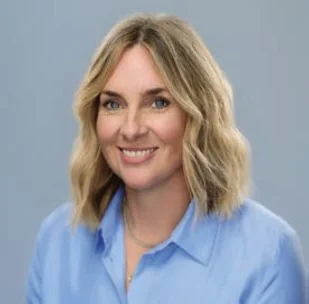
We actively promote an inclusive culture where talent and capability are valued above all else. We invest in training, encourage career progression for all employees, and promote a workplace environment where everyone feels respected and supported.
What skills or qualities do you think women bring to the industry that may be underappreciated?
Women often bring strong problem-solving skills, adaptability, and attention to detail. These qualities that are essential in highstakes industries like crane hire.
Additionally, communication and collaboration are key strengths that contribute to safer and more efficient site operations.
Can you share any memorable experiences – good or bad – that highlight what it’s like to be a woman in this industry?
One of the most rewarding experiences has been mentoring and supporting other women entering the industry.
Seeing more women step into leadership and operational roles is a sign that things really are changing.
On the flip side, there have been moments where we’ve had to challenge outdated assumptions, but every challenge has made us more determined to drive progress.
We’ve been around a long time and the manufacturers, other crane operators and our customers know us.
What advice would you give to a women considering a career in the lifting industry?
Go for it! This industry offers incredible opportunities, job satisfaction, and career progression. Be confident, stay curious, and don’t be afraid to step into roles that may not traditionally have been filled by women.
Find mentors, ask questions, and always strive for excellence. There’s so many great people in our industry. We love working in it and we’ve learnt so much from some of the best. We’ve had some great people in our business, people who have been around for a long time and they’ve passed some great knowledge on to us.
Where do you see the future of crane hire and lifting heading in terms of gender diversity?
The industry is evolving, and we expect to see more women taking on roles at all levels.
Companies are realising that diversity strengthens businesses, and initiatives to attract and retain female talent will continue to grow.
We’re hopeful that in the coming years gender diversity in crane hire will no longer be a discussion point – it will simply be the norm. Having said that, I don’t think there’s currently another female MD in the whole of the UK crane rental industry; and the same applies for an HR Director. We are few and far between.
How would you make the industry more welcoming for women?
More visibility and support networks for women in construction and lifting. When women see others thriving in the industry, it encourages them to pursue similar paths. Creating mentorship programmes, networking opportunities, and ensuring inclusive workplace cultures would make a huge difference.
GILL RILEY, CBE, MANAGING DIRECTOR, GGR GROUP
Gill Riley is managing director of GGR Group. Gill co-founded the company in 1995 with a vision to bring innovative lifting solutions to the UK market.
Over the past three decades she has transformed the business from a small family-run operation with an initial £5,000 investment into a £37 million compact crane and lifting equipment business. Today, GGR Group employs over 150 staff members across three depots in Oldham, Haddenham, and Glasgow, providing specialist solutions to construction, glazing, and other industries.
In the 2025 King’s New Year’s Honours List Gill has been awarded a Commander of the Order of the British Empire (CBE) in recognition of her services to the lifting industry. This CBE is a testament to her relentless drive, entrepreneurial spirit, and commitment to advancing industry standards while championing sustainability and safety in construction and engineering.
Beyond her professional achievements, Gill is also celebrated for her efforts to inspire and mentor the next generation of industry leaders, encouraging innovation and gender diversity within traditionally maledominated sectors.
The construction and lifting industries are traditionally male-dominated. Have you faced any particular challenges as a woman in this field?
As a woman working in the construction industry, I’ve seen firsthand the pressure that women often feel to prove themselves in what is still largely seen as a male-dominated environment. However, this shouldn’t be the case. Your skills and abilities are what truly matter, not your gender. There may be times when others doubt you simply because you’re a woman, but it’s important not to let that shake your confidence. Trust in your training, your experience, and your ability to keep learning and growing.
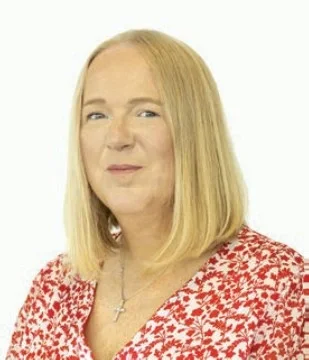
How does GGR Group support diversity and inclusion in the workplace?
As a woman working in construction and part of a familyrun business, my brother Graeme and I have always been committed to encouraging female talent within GGR Group.
We’re incredibly proud of the women who’ve made their mark in our business. Notably, Kirsty Parkin, who started as an operator here and went on to become a surveyor and appointed person, specifying equipment for some of the most high-profile infrastructure projects in London.
Additionally, operator Olivia Rollinson has made her mark as a crane operator in the North, contributing to National Grid lifting projects. My daughter, Harley Parkin, has recently joined the team as an Account Manager in London after two years of hands-on experience working as a crane operator on some of the city’s biggest and most prestigious construction projects.
Further to this, many of our managerial roles are led by women. At GGR Group, we take immense pride in championing female advocacy and leadership within the construction industry. It’s part of who we are.
What advice would you give to a woman starting out in the lifting industry?
One of the most valuable things you can do is connect with other women in the industry.
There are numerous networks and organisations dedicated to supporting women in construction and lifting, offering advice, camaraderie, and career opportunities. LinkedIn, for example, is an excellent platform to build relationships and share knowledge with other women who can offer support and inspiration.
There will be moments of frustration or challenges along the way, especially when navigating a traditionally male-dominated space. Keep pushing through, stay resilient, and don’t let setbacks define you. Each challenge is an opportunity to prove your capabilities and strengthen your character. By succeeding and showing up, you’re helping to change the narrative for future generations of women in construction.
Also, remember to have fun in the industry – it’s an amazing industry to be involved in. I walk around London and know as a company we have had an impact on so many of the new buildings in the city, it’s something to be proud of. There are some amazing people in the industry – don’t let the minority put you off.
SARAH SPIVEY, MANAGING DIRECTOR, MODULIFT
Sarah Spivey is managing director of spreader beam and lifting equipment manufacturer Modulift – where she has worked since 2008. As an experienced professional focussed on the strategic growth and development of the business Sarah says her goals are to drive the Modulift brand forward to become the number one lifting engineering company world-wide and help change the face of the lifting engineering industry, increasing training and safety awareness around the world.
What inspired you to work in the lifting industry?
What inspired me to work in the lifting industry was the unique combination of challenges and innovation it offers.
After gaining a degree in Business Studies, I started my journey in marketing, progressing to managing director at Modulift. I quickly became interested in how the lifting industry drives essential infrastructure and operations. The opportunity to contribute to a field that not only prioritises safety but also pushes boundaries in terms of technology and solutions resonated with me.
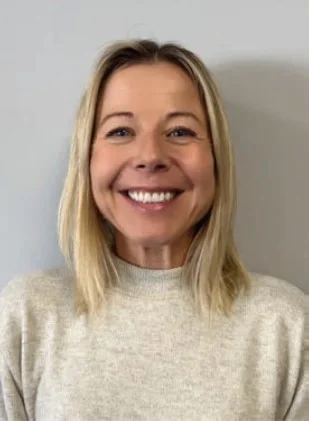
The construction and lifting industries are traditionally male-dominated. Have you faced any particular challenges as a woman in this field?
I have always believed that knowledge, skill, and determination speak louder than gender. Over time, I’ve built credibility and a strong support system, which has helped me navigate the challenges of a male-dominated sector.
Do you think attitudes towards women in construction and lifting have changed over the years?
Yes, but progress is ongoing. There is greater awareness now of the value diversity brings to the industry, and I’ve seen more initiatives encouraging women to pursue careers in lifting and construction. That said, there is still work to do in normalising female leadership and technical expertise in these fields.
What do you think needs to happen to encourage more women to join the industry?
We need to start early – promoting STEM subjects in schools and creating visibility for female role models in lifting and construction.
Companies should actively engage in mentorship programs, offer flexible career paths, and challenge outdated stereotypes.
What are the benefits having more women in a workforce can bring?
A more diverse workforce brings different perspectives, innovative solutions, and a more balanced approach to leadership and teamwork.
Diverse teams perform better, and having women involved leads to stronger collaboration, problem-solving, and communication within teams.
Are there any particular areas of lifting that you see as being more accessible for women to work in? And are there certain areas you think need more women?
Women are already making strides in engineering, project management, sales, marketing and finance roles. However, I’d love to see more women in hands-on lifting operations, crane operation, and site leadership positions. These areas would benefit from different approaches to risk management and leadership styles.
How does Modulift support diversity and inclusion in the workplace?
At Modulift, we promote a culture of inclusion, ensuring that everyone has equal opportunities for growth and success.
We actively encourage diversity in hiring and provide training and mentorship to support career progression for all employees.
What skills or qualities do you think women bring to the industry that may be underappreciated?
Women often excel in communication, collaboration, and attention to detail – skills that are essential in lifting operations where safety and precision are paramount. Additionally, problem-solving and adaptability are qualities that women bring to leadership roles in the industry.
What advice would you give to a women considering starting a career in crane hire, construction, or lifting?
Believe in yourself, be persistent, and seek out mentors who can support your growth.
Never be afraid to step out of your comfort zone – technical skills can always be learned, but confidence and determination will set you apart.
LEANNE WHITEHURST-MAIDEN, RSS
Leanne Whitehurst-Maiden is national digitalisation manager at UK lifting and rigging product provider Rope and Sling Specialists. Whitehurst- Maiden is leading development of the company’s live365 online inspection software across a national network of depots.
As one of the sector’s leaders in digitalisation Leanne is pioneering the industry’s move towards wider uptake of the live365 system, which has standardisation and training at its epicentre.
What advice do you have for a woman starting out in the lifting industry?
Attracting young people into the lifting industry in general is difficult. I think most of us here would admit this is not an industry we aspired to be part of when we were young, most likely not even considered before. That, for women seems to be amplified, given the underrepresentation that still exists, particularly in more senior roles, along with the perception that it is a male-dominated industry.
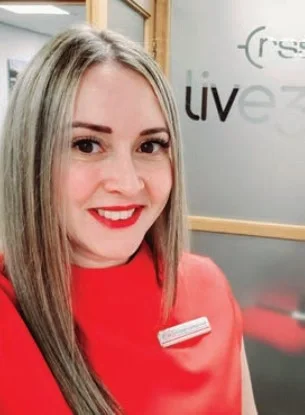
We as an industry must think about how we attract talented young individuals, because we know what rewarding career paths are available. The opportunities for diversity of roles within the UK lifting industry are huge and ever changing as we adapt and modernise. I believe the challenges are for those of us within the industry to promote those opportunities more successfully and find better ways of engaging with young people, especially women. For those women who are just starting out within the UK lifting industry, I would say take every opportunity of training that is presented to you as these will form the foundations for your future careers, whatever interesting direction they may take.
KATIE KELLEHER, CPA
Katie Kelleher is technical and development director at UK trade association the Construction Plant-hire Association (CPA). The role was newly created for her in April 2023.
Her journey in lifting started in 2014 when she took a lifting technician apprenticeship at Select Plant Hire, a division of UK construction company Laing O’Rourke. Over the next eight years she gained a wealth of lifting experience, specialising as a crawler crane operator. The cranes she operated included an LTR 1100 (on a barge in central London) and a Liebherr LTR1060.
More recently she worked as Appointed Person on a number of high-profile infrastructure projects.
Katie is well-known in the construction industry for being a champion for women and young people working in construction, and is a passionate and active speaker about apprenticeships and the workforce.
What’s one piece of advice you’d give a woman starting out on her career in the lifting industry?
Never be afraid to ask questions – it’s how you learn, grow, and gain confidence. No one knows everything and the best in the industry are always learning. Step forward, take up space and remember your voice and skills are just as valuable as anyone else’s… You got this!




